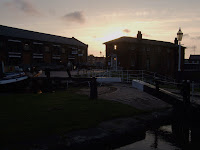Tommy Thompson (1880-1951)
Tommy Thompson was best known as a writer in the Lancashire dialect, and he wrote short sketches of Lancashire life for the back page of the Manchester Guardian from the late 1920's until his sudden death on February 15 1951. He also appeared regularly on the North Regional programme of the BBC in the 1940's, where he gave Wilfred Pickles his first break as Owd Thatcher in the barber shop where many of the sketches were set.
Most of the sketches from the Manchester Guardian were published in a series of books which were very successful in their day, and apparently were also very popular with American servicemen stationed in the North of Britain during World War II. He also wrote three novels
Blind Alley, Crompton Way, and
Cuckoo Narrow which were less successful, as well as a one-act comedy
Stick-in-the-Mud, and his "little autobiography"
Lancashire for me written in standard English.
Bernard Wrigley, the folksinger sometimes known as "the Bolton Bullfrog" has read some of Tommy Thompson's sketches on BBC Radio Lancashire, but I don't think he has recorded any of them. I hope the best of the sketches, and the autobiography, will one day be republished, as they well deserve a new readership.
The short pieces are full of a gentle humour, which can actually be quite sharp at times, and his characters are fully rounded individuals who come to life in a few short, pithy phrases. The rambling discussions in Owd Thatcher's barber shop are excellent of their kind; Tommy Thompson had a real genius for dialogue. The language is rich and expressive, and it is a real pleasure to read slowly while relishing the clear picture Thompson draws of some very extraordinary 'ordinary folk'.
Here is a short extract from a piece in 'Lancashire Pride': Music Hath Charms where the men in the barber shop are talking about music.
"When Ah wor in th' village band we played 'Faust,' " said Jim Gregson.
"Which on 'em?" said Young Winterburn, "Gounod or Berlioz?"
"Both," said Jim. "We'd only five copies o' either. Ah wor on Gounod an' our Sam wor on Berlioz. Ah showed him who could play cornet. He never played a note after that do."
"It'd sound like Wagner," said the barber.
"When Ah wor a choir lad," said Farmer Platt, "we sung under the vicarage window when th' parson lay on his death-bed. He didn't tarry for an encore."
"It con be terr'bly soothin'," said Owd Thatcher, "con music. That's why they play it in eatin'-houses. If tha chews a bit o' tough steak to a good tune tha con down it in no time."
"Ah like chamber music," said Young Winterburn.
"What's that?" asked Owd Thatcher.
"Why," said Jim Gregson, "there's about four or five on 'em sits in a ring, an' one fiddle says 'Tiddley oom,' the t' other fiddle says 'Piddley pom,' then th' owd big fiddle chips in wi' 'Grunt, grunt,' then they o' han a do at each other 'ell for leather until it's oppenin' time."
"In th' owden times," said Young Winterburn, "folks used to stop in an' sing madrigals."
"They knew no better," said Alf Higson. "We're civilised now."
From:Tommy Thompson, Lancashire Pride, 1945















